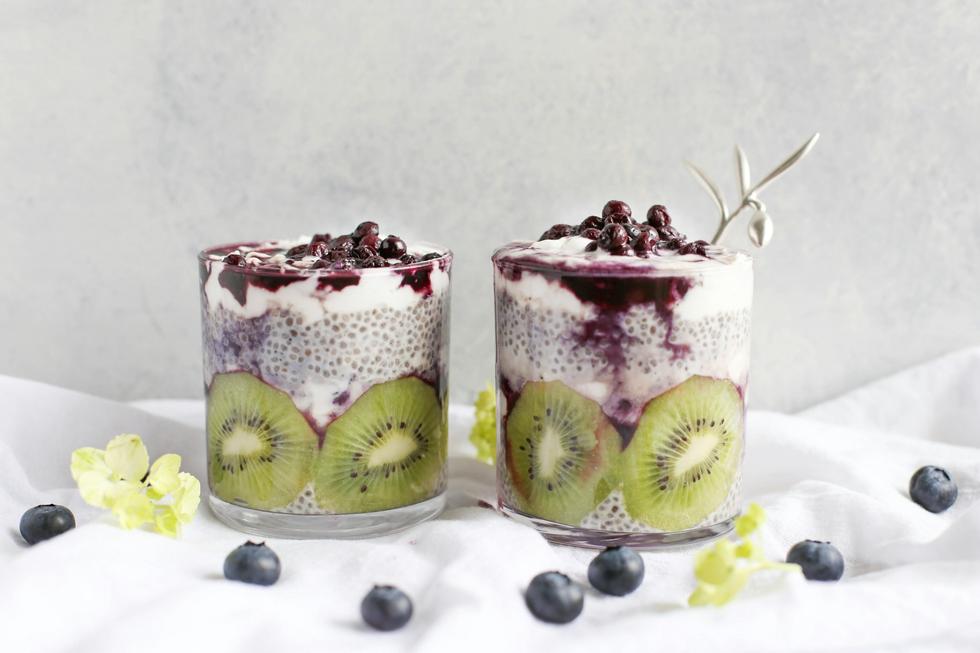Quick version
Chia seeds are rich in:
- Fibre: Good for digestion.
- Omega-3 fatty acids: Important for heart health and reducing inflammation.
- Protein: Contains all essential amino acids.
- Minerals: Calcium, magnesium and phosphorus for bone health.
- Antioxidants: Protects against free radicals.
- Digestion and gut health: Rich in fiber which improves bowel function.
- Heart health: Omega-3 contributes to reduced inflammation and improved heart function.
- Weight control: Helps with satiety.
- Blood sugar control: Stabilizes blood sugar levels.
- Bone health: Supports strong bones and teeth.
- Energy Enhancement: Increases energy levels and stamina.
- Calories: 486 kcal
- Carbohydrates: 42.1 g (of which 34.4 g fibres)
- Protein: 16.5 g
- Fat: 30.7 g (of which 17.8 g omega-3, 5.8 g omega-6)
- Minerals: Calcium, magnesium, phosphorus, iron and zinc.
Recommended daily amount is 1–2 tablespoons (10–20 grams). Larger amounts can cause stomach upset.
Allergies and contraindicationsSome may be allergic to chia seeds, especially those with seed allergies. Too much chia seeds can lead to digestive problems, so gradually introduce them into the diet.
What are chia seeds?
Chia seeds are small black or white seeds that come from the plant Salvia hispanica, a flowering plant native to Central America. Chia seeds have been used as a source of nutrition for thousands of years, especially by the ancient Aztecs and Mayans.
What do chia seeds contain?
Chia seeds are healthy and highly nutritious and have become popular due to their high content of:
- Fibre: Good for digestion and gut health.
- Omega-3 fatty acids: Plant-based fatty acids important for heart health and inflammation.
- Protein: A complete plant-based protein that contains all essential amino acids.
- Minerals: Contains calcium, magnesium and phosphorus which are important for bone health.
- Antioxidants: Protects the body against harmful free radicals.
Chia seeds absorb a lot of liquid and form a jelly-like substance when mixed with water, making them popular in healthy smoothies, puddings and as an alternative to eggs in baking. They are also easy to add to yogurt, salads and other dishes to increase the nutritional content.
What are chia seeds good for?
Chia seeds are very useful and good for a variety of health benefits due to their nutritional content. Here are some of the top health benefits of chia seeds:
- Digestion and gut health: Chia seeds are rich in fiber, which helps improve digestion and promotes healthy gut health by preventing constipation.
- Heart health: Thanks to their high content of omega-3 fatty acids, chia seeds can help lower inflammation, reduce cholesterol levels and improve heart health.
- Weight control: The fiber content of chia seeds helps create a long-lasting feeling of satiety, which can reduce overeating and contribute to weight control.
- Blood Sugar Control: Chia seeds help stabilize blood sugar levels by slowing the conversion of carbohydrates to sugar in the blood, which is good for people who want to manage their blood sugar.
- Bone health: They are a good source of calcium, phosphorus and magnesium, which support strong bones and teeth.
- Energy boost: Chia seeds are packed with protein, omega-3 fatty acids and other nutrients that can boost energy levels and improve endurance.
- Skin and anti-aging: Thanks to the antioxidants in chia seeds, they can help protect the skin against damage from free radicals and support skin health and elasticity.
In summary, chia seeds are good for general health, especially for digestion, heart health, weight control and bone strength.
Chia seeds nutritional value
Chia seeds are packed with nutrients, making them a popular superfood. Here is an overview of the nutritional value of chia seeds per 100 grams, (RDI stands for recommended daily intake):
- Calories: 486 kcal
- Carbohydrates: 42.1 g
- Fibre: 34.4 g (very high fiber content)
- Sugars: 0.5 g
- Protein: 16.5 g
- Fat: 30.7 g
- Saturated fat: 3.3 g
- Monounsaturated fat: 2.3 g
- Polysaturated fat: 23.7 g
- Omega-3 (ALA, alpha-linolenic acid): 17.8 g
- Omega-6: 5.8 g
- Calcium: 631 mg (63% of the RDI)
- Magnesium: 335 mg (84% of the RDI)
- Phosphorus: 860 mg (123% of the RDI)
- Potassium: 407 mg
- Iron: 7.7 mg (55% of the RDI)
- Zinc: 4.6 mg (42% of the RDI)
Chia seeds are an excellent source of fiber, protein and healthy fats, especially omega-3 fatty acids. They also contain important minerals such as calcium, magnesium, phosphorus and iron, which makes them very nutritious despite their small size.
Note that 100 grams is a relatively large amount of chia seeds, and the usual daily consumption is often around 1-2 tablespoons (about 10-20 grams), which provides a lower but still significant amount of nutrients.
How much chia seeds should you eat per day?
The recommended daily amount of chia seeds is usually around 1-2 tablespoons per day, which corresponds to approximately 10-20 grams. This provides a significant amount of fiber, omega-3 fatty acids and other nutrients without overdoing the intake. Consuming more than this amount can cause stomach upset due to the high fiber content, so it is good to start with smaller amounts and increase gradually if you feel your body tolerates it well.
Allergies and contraindicationsAlthough chia seeds are generally considered safe and healthy for most people, it is important to be aware of any allergies or contraindications. Some people may develop an allergic reaction to chia seeds, which may result in symptoms such as itching, rash, difficulty breathing or stomach upset. Those with known seed allergies, such as sesame or mustard seed allergy, should be extra careful. In addition, the high fiber content can cause digestive problems such as bloating or gas if consumed in excessive amounts, especially in people with sensitive stomach or intestinal problems. Therefore, it is important to introduce chia seeds gradually into the diet and to consult a doctor if any negative reactions occur.























